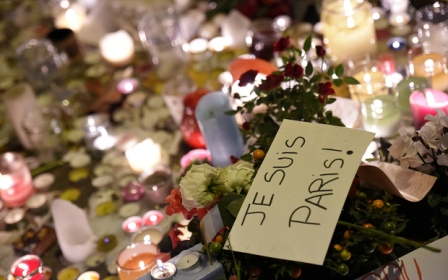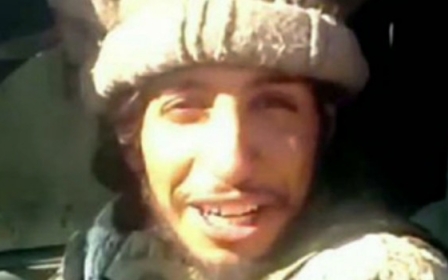Killing of Paris 'mastermind' confirmed as French state of emergency extended

Abdelhamid Abaaoud, the alleged mastermind of the attacks in Paris that killed 129 people last weekend, was killed in a police raid early on Wednesday, French prosecutors have confirmed.
At least two people, including one who is thought to be a woman who detonated an explosives vest, are believed to have been killed in the Wednesday operation which lasted for seven hours and saw police rain down fire and grenades on a Paris apartment block.
Abaaoud, a Belgium national who fled to join Islamic State in January, appears to have returned to France from Syria earlier this year following three failed terror attacks in mainland Europe.
On Thursday, Interior Minister Bernard Cazeneuve said France received "no information" from other European countries and insisted that "Europe wakes up, organises itself and defends itself against the terrorist threat".
French Prime Minister Manuel Valls, welcomed news of the killing and praised the "exceptional work" of the French security services.
The confirmation of Abaaoud's death comes as French lawmakers on Thursday voted to extend a state of emergency in the country for three months, and also passed new powers to block websites and social media platforms.
Police sources have said that Moroccan intelligence helped French investigators find Abaaoud, AFP reported.
Future emergency extensions?
The state of emergency will be in place from 26 November although there will be scope to extend it further.
"We have already seen statements in the press, notably from Valls as well as Interior Minister [Bernard] Cazeneuve, that we may well have to further prolong the state of emergency beyond the three-month period,” Philippe Marliere, a professor of French and European Politics at University College London, told Middle East Eye.
“When you say 'state of emergency', it sounds exceptional and dramatic which is not there to last but we could be with it for a few months," Marliere said.
President Francois Hollande announced an initial state of emergency shortly after the massacre on Friday. The measure increases police powers and allows the government to clamp down on media and protests.
Under previous legislation, which dates back to the 1950s and was introduced as part of the response to the Algerian war of independence, the state of emergency could only be enacted for 12 days. Until the Paris attacks, it had only been enacted a few times and used in designated areas rather than nationally.
However, last Friday's attacks have led to widespread calls for more security to prevent further attacks, which many commentators believe could be around the corner. France has since announced it will spend an extra 600 million euros ($641 million) next year to ramp up security, adding more than 8,500 law enforcement jobs including 5,000 new police.
Ahead of Thursday's vote, Valls warned that France was at risk of a chemical or biological weapons attack.
"We must not rule anything out," Valls said. "There is also the risk from chemical or biological weapons."
Louisa Loveluck, Middle East correspondent for the Telegraph newspaper, said that as yet there was no "evidence to suggest that the French have uncovered a specific plot involving the use of chemical weapons. This is, however, the sort of scenario that British counter-terrorism officials have apparently been monitoring closely in recent months.
"In Isil's [IS] self-declared 'caliphate', there the group has used a mustard agent - known colloquially as mustard gas - on several occasions, against both Kurdish Peshmerga fighters and Syrian civilians," she wrote on Thursday.
Controversial powers
During the state of emergency, French off-duty police will be allowed to carry guns, authorities said.
French police spokesman Jerome Bonnet told BFM TV that police officers who volunteer would be able to carry their handgun in order to "protect themselves and the population in public places".
The move is seen as highly controversial.
“Traditionally this has been a request of the far right in France," Marliere said. "It does nothing to reassure the public – [and is] an Americanisation of public life. When you are off duty, you can drink and then you drink and have a gun in your pocket.”
“Municipal police will also be armed. Only the national police can now carry guns – so this is a big, big shift in policy. But this is bizarre. How can that help with the issue of terrorism? There is no clear link between terrorism and holding guns.”
“... We could see a knee jerk over-reaction leading to a radical shift," he added.
Valls has also called on France's EU partners to urgently adopt measures to share airline passenger information.
"More than ever, it's time for Europe to adopt the text... to guarantee the traceability of movements, including within the union. It's a condition of our collective security," he said.
Sudden impact
Citing security fears, the government has cancelled two mass rallies scheduled for 29 November and 12 December - the days before and after a key UN climate summit to be held outside Paris.
Environmentalists have spoken out about the move, warning that it could be the first step in a wider crackdown on groups that might threaten the government line, although the French public at least for now appears to be rallying around the government.
“The rally around the flag effect is likely to be short-lived,” said Mujtaba Rahman, analyst at political risk consultancy Eurasia Group, told the Wall Street Journal.
The media is also expected to be impacted by the latest government moves. While the state of emergency measures were initially not directed at the press, the announcement that some social media users and some websites will be targeted and closed marks a drastic reversal from previous policy.
“The big theme after [the Charlie] Hebdo [attacks in January in which 17 people were killed] was freedom of speech because they [the attackers] wanted to silence cartoonists,” UCL’s Marliere said.
“Now it is the government that might possibly, in some cases, be silencing dissent. We are not there yet, but we clearly have to be put in the context of the very strong rhetoric we are seeing coming from Valls, Hollande and others saying - we are at war.”
“This is very unusual in the French context. He is a socialist and this kind of rhetoric is much more what you would associate with the right," he said.
Stay informed with MEE's newsletters
Sign up to get the latest alerts, insights and analysis, starting with Turkey Unpacked
Middle East Eye delivers independent and unrivalled coverage and analysis of the Middle East, North Africa and beyond. To learn more about republishing this content and the associated fees, please fill out this form. More about MEE can be found here.




